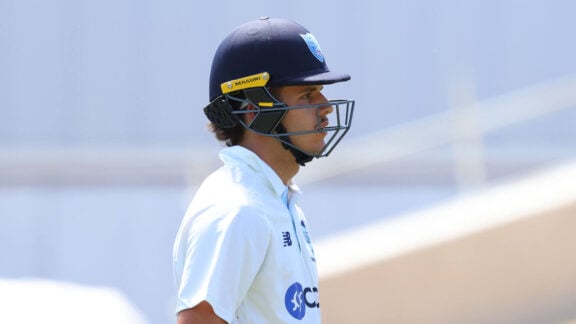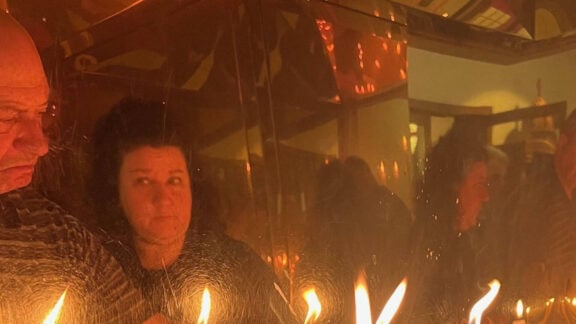A fortnight ago, Labor saw a flicker from what may have looked like a diminishing light on the hill. It rolled out the big guns—health.
A signature Labor policy, the party committed $8.5 billion over four years and tripled incentives for doctors to provide near-universal bulk billing. The election promise was swiftly followed by a Coalition pledge to match the commitment “dollar for dollar.” Clearly, a good sign.
Nine out of ten GP visits will be free from out-of-pocket expenses by 2030 under a keystone pre-election pitch to voters struggling with rising healthcare costs.
Health Minister Mark Butler said it was the largest single investment in Medicare since its inception in 1983. He told Neos Kosmos the policy could boost the bulk-billing rate to 90 per cent.
Last year, on the 40th anniversary of Medicare, Butler declared GP clinics were facing the most uncertainty since the program’s inception.
“The community and the Royal College of General Practitioners told the government that Medicare was ‘in freefall,” he said.
Butler pointed to the last extension of bulk billing for “pensioners, concession card holders, and kids under the age of 16” as proof that the system could be revived.
“Bulk billing has gone back up for that cohort, to over 90 per cent,” he told Neos Kosmos.
Medibank, introduced by former prime minister Gough Whitlam as a not-for-profit health insurance scheme in the 1970s and later reformed into Medicare by Bob Hawke, is, according to Butler, “the most important social program that we have.”
“It delivers Australia probably the best healthcare outcomes in the world—when you look at global rankings,” he said.
Butler told Neos Kosmos that “free hospital care, public hospitals, and free GP care have always been central to the mission of Medicare.”
Before Labor introduced Medicare, “one in seven Australians did not have health insurance.”
“The biggest cause of personal bankruptcy in the country disappeared overnight.”
For those without a concession card, bulk billing “has been slipping very sharply and was now down to about 60%.”
Limitations on bulk billing and increased gap payments for GPs were becoming “a health issue,” Butler said.
“We decided to extend that bulk-billing incentive for all Australians,” he said.
It was important, he added, for communities that “don’t qualify for concession cards, but they’re not wealthy.”
“They’re already under cost-of-living pressure, and additional gap fees to see the doctor are not only hurting their household budgets but also their health.
“More and more of them are going without a visit to the doctor, or sometimes going without a script for their pharmacy because of cost.”
The measure, Butler says, will have both a “hip-pocket and public health benefit.”
General practices, he added, will get “an additional 12% loading on top of their Medicare income if they bulk bill everyone who comes through their doors.”
Almost 5,000 general practices—out of about 8,000 in the country—”will be much better off,” he said.
He acknowledged the need for more doctors and pointed to an increase in registrations.
“We’ve had more medical practitioners in the past two years than at any time in the past decade, but we’re still running short in a lot of areas.”
Older GPs are retiring, and the new ones entering the system are “not working full-time.”
“The average is about three days a week—we’re not getting one-for-one with the younger doctors coming in.”
More medical school places have been announced, along with “a lot of incentives for junior doctors when they graduate from medical school.”
The idea is to encourage them to choose general practice as a career “rather than becoming a surgeon, an anaesthetist, or a radiologist,” Butler said.
Greens leader Adam Bandt took to social media seeking recognition for what he claimed was a Greens policy.
“That’s what the Greens do,” laughed Butler. “I don’t really care if the Greens take credit for it.”
“Success has a thousand fathers, and failure is an orphan.”
“The question, though, is whether people trust the Opposition with this?” he said.
“We’re the party of Medicare. We created it—we fought hard for it. When we introduced it, doctors threatened to go on strike over it, and the Liberal Party tried to abolish it, election after election.”
“But the Australian people voted for it because they cherish that idea Gough (Whitlam) first put before them in the 1970s.”
“Every Australian is entitled to the world’s best healthcare, no matter their income. It’s a quintessentially Australian idea.”
Butler recalled that Opposition Leader Peter Dutton “made a promise before the 2013 election that they’d back in Labor health policy.”
“But within a few months, Dutton—then Health Minister—tried to abolish bulk billing altogether and cut $50 billion from the public hospital system.”
“Dutton bizarrely tried to introduce a fee whenever you went to a hospital emergency department.”
“You know, poor triage nurses at the front door were expected to have machines where people tapped as they got wheeled in on a gurney because they were having a heart attack.”
“There’s a reason why doctors voted Dutton the worst health minister in the history of Medicare,” Butler added.








